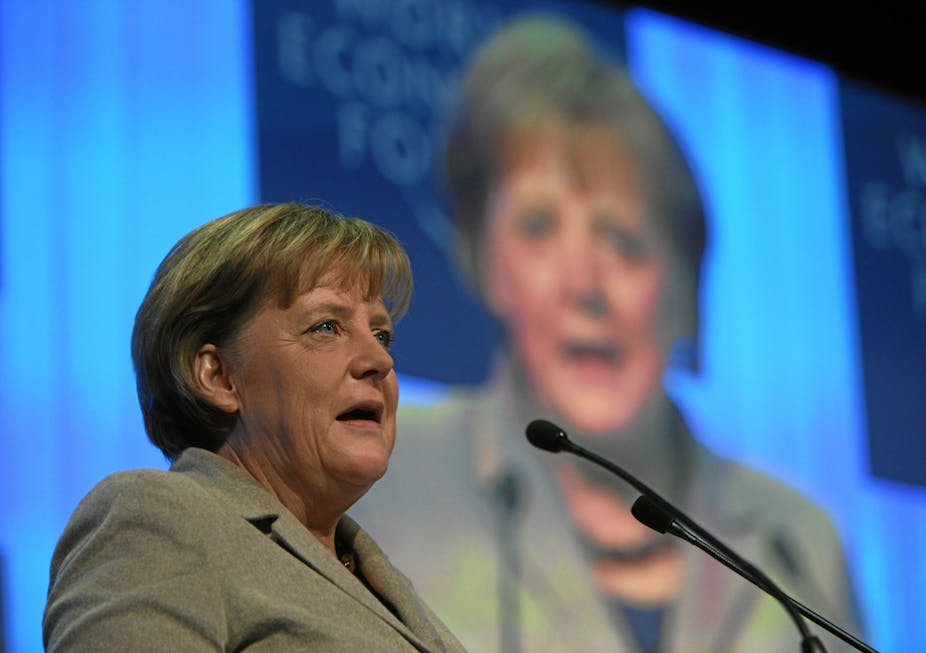The results of the German election have been described as a triumph for Angela Merkel. Her Christian Democrats bounced back from their second-worst result since 1949 to heights they have not seen since the 1990 (re-unification) election. At 41.5%, they came awfully close to an outright majority, something the party has not achieved since 1957 (although then it had a much bigger share of the vote ).
The Social Democrats (SPD), on the other hand, has hardly recovered from its devastating 2009 result - 25.7% is still the second-worst result since the war. But the combined vote share of the two major parties – often described as “former major parties” by pundits – has gone up for the first time since 2002.
Both the Greens (at one stage projected to garner 15%) and the Left have lost more than 20% of their support compared to their 2009 results, and for the first time since 1990, the number of parties in parliament has gone down. And that is of course because the FDP has gone from 14.6% (its best result ever) to 4.8% (its worst result ever) and is not represented in parliament for the first time since 1949.
No national presence
To put this in perspective, let me remind you that during the past 64 years, only between 1956 and 1961 and 1998 to 2009 did the FDP not hold government positions. It was in government for roughly 70% of the time, usually holding key positions (foreign affairs, economy, justice) and punching far above its electoral weight. For most German politics aficionados, it will take some time to get used to the idea of the party not having a national presence. Their result, combined with the relatively strong showing of the new, eurosceptic Alternative for Germany party means the number of wasted votes must be near its all-time high, with proportionality going out of the window.
But there is something else.
In the past, the FDP has survived – and sometimes thrived – due to tactical considerations. Loyal supporters are few and far between, but often, supporters of the CDU would give it their list votes to bring about a centre-right majority. Most of the time, the CDU would not openly encourage this behaviour but would also refrain from discouraging it. Sometimes, the two parties even came up with joint position papers for future governments, signalling that they were not exactly a pre-electoral alliance but very much part of the same camp.
But this year (following the FDP’s defeat in Bavaria only a week before the General election), the CDU sent out a clear, high-profile “everyone for themselves” message to their voters. I can see three reasons for that.
First, recent electoral reforms designed to make the system more proportional mean that the CDU would not benefit from a by-product of tactical CDU/FDP voting, the so-called “surplus seats”. Second, the “loan vote” strategy has recently backfired in Lower Saxony, leaving a weakened CDU on the opposition benches. Third, the CDU may well have anticipated a grand coalition after Bavaria, and in that case, bolstering the FDP would not have made sense.
Licking wounds
But this was probably a self-fulfilling prophecy. Though she came close, Merkel did not win an outright majority. Christian Democrats and FDP together, on the other hand, are stronger than the three left parties combined: 46.3% vs 42.7%. That would have been enough for Merkel to continue the centre-right coalition (her preference), with the added benefit of having a much more docile, dependent partner.
Negotiating a coalition with the SPD will be tough. The party is licking its wounds and is highly reluctant to enter such an arrangement after the 2009 disaster that followed their last co-operation with the Christian Democrats. A CDU/Green coalition, while arithmetically feasible, seems highly unlikely at the moment, so the SPD will try to extract a large premium from the Christian Democrats for going into government with them. In the end, coalition talks could fail, and Germany could go to the polls again.
Without doubt, this result is a great triumph for Merkel. But the CDU leadership may have outwitted themselves in terms of their coalition partners.
This is an edited version of a piece that appeared on Kai Arzheimer’s blog.

